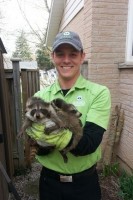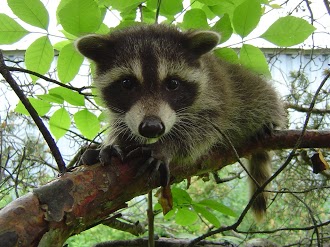This is the time of year raccoons will be looking for their winter food source, and you may see them out and about more than ever.
Skedaddle Humane Wildlife Control wants you to be on the lookout for raccoons acting strangely, as this is the time of year where raccoons may have contracted distemper.
While distemper poses no health risk to humans, it can pose a threat to your dogs and cats.
What is Distemper?
Canine Distemper
Canine Distemper is a viral disease affecting animals in the canine families in addition to some other mammals. It affects the respiratory, gastrointestinal and nervous systems. Raccoons are pre-disposed to this disease as are dogs. It also commonly infects skunks. The disease is most often fatal and those that recover may display permanent neurological damage.This type of distemper is a common occurrence in large raccoon populations. Mortality is higher in juveniles compared to adults.
Feline Distemper
This form of distemper is also known as feline panleukopenia or cat fever this is a highly contagious viral ailment that affects Felidae, Procyonida and Mustelidae families.
How Distemper Spreads
Distemper lives outside of the body for an extended period of time, possibly months, and can be transmitted through feces, saliva or skin. The disease is transmitted through airborne droplets, direct contact with body fluids, saliva or raccoon droppings.
Raccoon distemper is cyclical and can spread and wipe out entire colonies of raccoons.
Signs and Symptoms of Distemper
- Canine distemper in raccoons starts slowly, initially appearing as an upper respiratory infection, with a runny nose and watery eyes developing into conjunctivitis (the most visible symptoms). As time wears on, the raccoon can develop pneumonia.
- The raccoon may be thin and debilitated and diarrhea is a clear symptom. In the final stage of the disease, the raccoon may begin to wander aimlessly in a circle, disoriented and unaware of its surroundings, suffer paralysis or exhibit other bizarre behavior as a result of brain damage.
- Many of these symptoms are indistinguishable from, and therefore often mistaken for, the signs of rabies which can only be determined by laboratory testing.
- Feline distemper virus is shed in all body secretions and excretions of affected animals. Fleas and other insects, especially flies, may play a role in transmission of the disease
- Raccoons with distemper may approach people, or curl up to sleep in open areas in close proximity to people. They generally act disoriented or lethargic, but can become aggressive if cornered. They may also have seizures.
- Raccoons with distemper may move slowly and may stumble as they walk.
- They lose their fear of humans, appear blind and confused and may wander aimlessly and may become aggressive if cornered
- A mucus discharge will often be present around the eyes and nose and may be accompanied by coughing, diarrhea, vomiting, tremors, seizures or chewing fits. They may only exhibit some of these symptoms and otherwise appear quite healthy.
Unfortunately, the disease is almost always fatal, meaning most afflicted raccoons will need to be euthanized.
Distemper and Your Pets
Pets that contract the disease can be cured, but they often live short and painful lives afterward because of the irreversible neurological harm. The best thing to do is vaccinate your pets.
Many people believe a rabies shot is all their pet needs, but the core vaccinations for dogs and cats include distemper, plus parvovirus for cats.
How to Protect Your Pets- Discourage raccoons or any wildlife from coming onto your property:
- Do not leave any food out. At this time of year, it would also be advised to take down any bird feeders, or regularly clean up the area around the bird feeder so you do not attract raccoons
- Ensure all garbage, recycling and Green bins are secure and left out on the morning of your regular pick up
- Keep your pet on a leash when on a walk and scan your yard before letting them outside
- Explain to your children why they should not approach raccoons or any wildlife even if they seem docile
- Check with your vet to ensure your pet has been vaccinated against distemper if you are not sure
Humane Animal Removal
 If you see raccoons hanging around your property, it is important to the help of experts to humanely and completely get rid of raccoons that infest your property. Getting rid of raccoons prevents the spread of distemper and other diseases and helps keep your pets safe. Call Skedaddle Humane Wildlife Control at 1.888.592.0387
If you see raccoons hanging around your property, it is important to the help of experts to humanely and completely get rid of raccoons that infest your property. Getting rid of raccoons prevents the spread of distemper and other diseases and helps keep your pets safe. Call Skedaddle Humane Wildlife Control at 1.888.592.0387
Proudly Serving: Hamilton, London, Mississauga, St. Catharines, Kitchener, Burlington, Cambridge, Guelph, Montreal, Oakville. Niagara. Waterloo, Halifax, Sudbury




